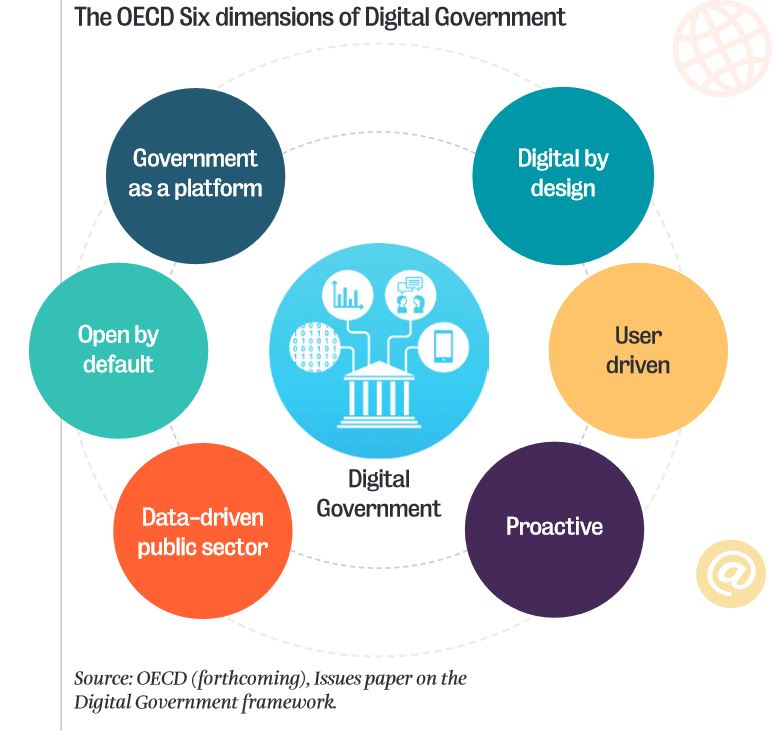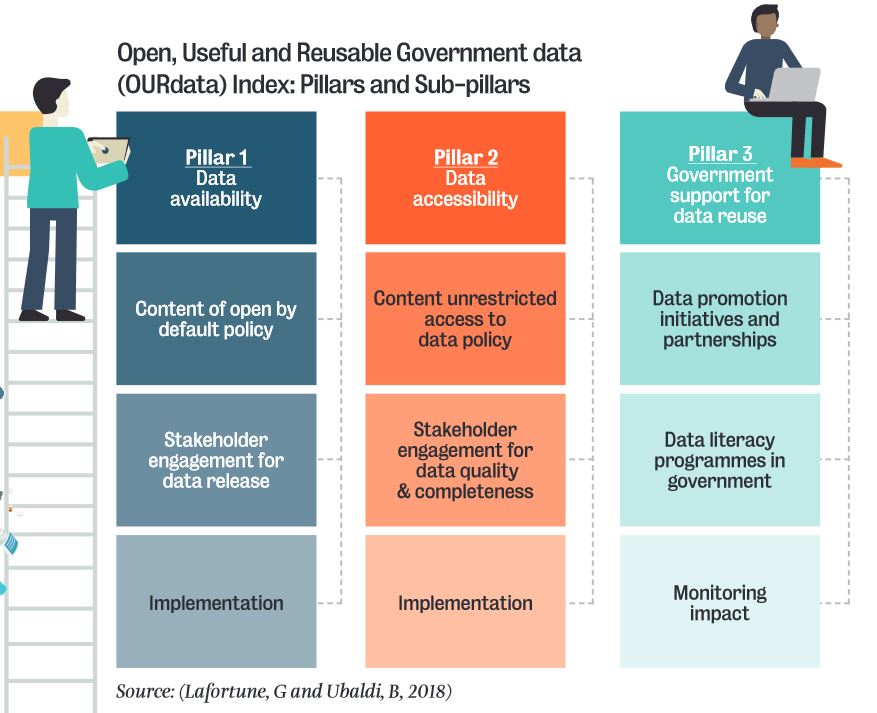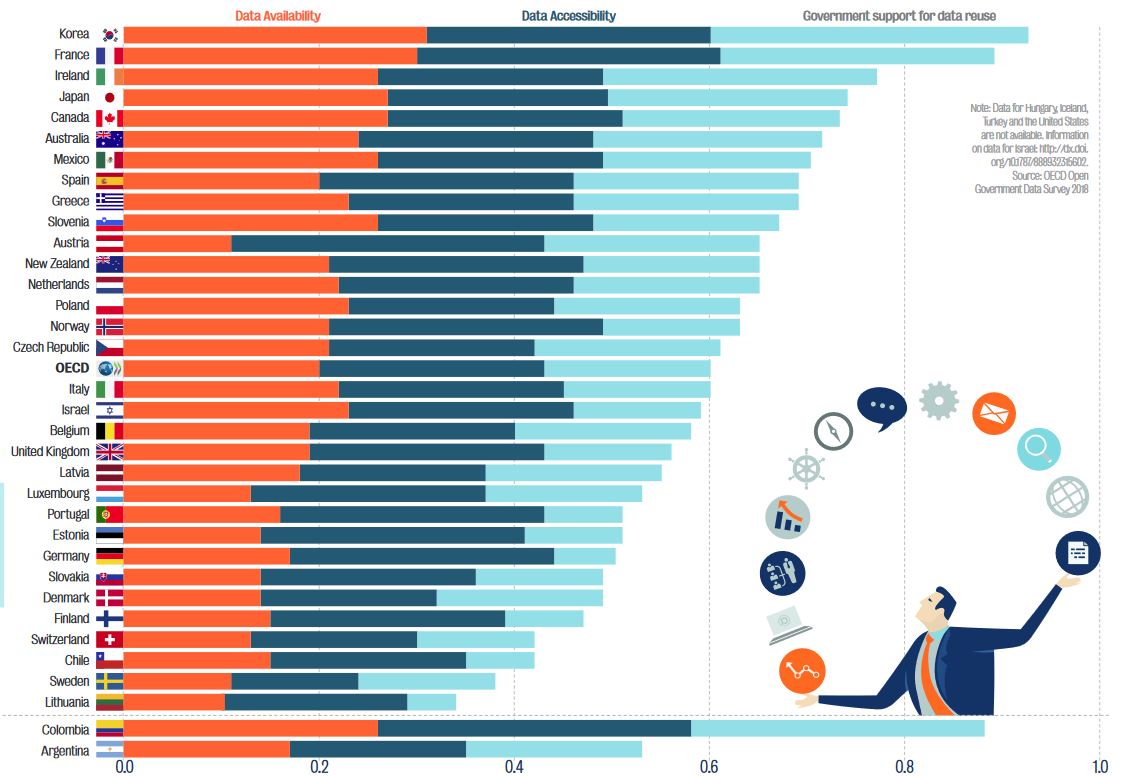OECD promotes open data as a key component of digital governments
Fecha de la noticia: 13-08-2020

The OECD's work on open data began in 2013, but has steadily expanded to reflect its growing importance in member and partner countries. The OECD sees open data as a key asset for economic development, digital innovation and good governance, while always paying special attention to privacy, transparency and ethics.
The OECD includes the need to create a culture based on data as one of the principles needed to promote the digital transformation of the public sector. In its own words "open government data is a public good, which must be delivered with a purpose, in a proactive manner and with a focus on reuse, in line with user needs and its potential contribution to the joint creation of value". In this sense, he has developed a series of indicators to evaluate the digital transformation of countries, based on 6 key dimensions:

The OURdata index: a way to measure the availability, accessibility and reuse of government data
The OURdata index, which evaluates the progress and challenges of open government data policies using 3 pillars, is based on this theoretical framework:
- Data Availability: measures the degree to which governments have adopted and implemented official requirements to promote open government data at the central level.
- Data Accessibility: measures the availability of formal requirements designed to promote unrestricted access to data.
- Government support for data reuse: measures the extent to which governments are playing a proactive role in promoting the reuse of government data within and outside of government.
These pillars are summarized in the table below:

The results of the OURdata 2019 index
The latest edition of the OURdata index published by the OECD is 2019. This report compares the results obtained with those of 2017, with the aim of finding out the state of maturity of the countries analyzed in order to promote improvements that will increase data flows.
The 2019 results show general improvements in all countries. Most countries have adopted the "open by default" approach, including formal requirements not only in the open data strategies, but also in laws and regulations. In addition, more and more governments are enabling their open data portals as communication and feedback tools. These portals are not intended to be mere "data catalogs" but rather platforms to foster innovative, collaborative and knowledge-sharing practices.
Despite these improvements, however, there are still areas for improvement at the general level. More sustainable, long-term approaches are needed, with more defined governance frameworks. There is also a need to boost the training of public officials and encourage high-level political commitment to help recognize the value of data. It is therefore necessary to focus not only on supply, but to put in place mechanisms that stimulate demand and reuse.
In this regard, the report provides a series of recommendations to OECD governments:
- Ensure political support for open data and establish enabling environments to sustain implementation efforts over the long term.
- Build a common approach with a focus on sustainable development and gender issues, among other areas.
- Create Open Government Data portals by adopting an "Open by Default" and "Government as a Platform" approach.
- Ensure that data publication is proactive, timely, and understandable to both humans and machines (using metadata, common standards, etc.), as well as addressing quality issues and biases in data collection and generation.
- Maintain practices that ensure the publication of high-value data taxonomies and their integration across different sectors, driving greater social, government and business innovation.
- Ensure open data policies and establish governance frameworks that facilitate data monitoring and are aligned with data protection regulations In this sense, the OECD has developed a framework for public sector data governance that includes good practices to be followed based on strategic, tactical and data availability components, detailed in its report The Path to Becoming a Data-Driven Public Sector.
- Establish federated models that facilitate data discovery, while maintaining the right levels of autonomy at the local level, and ensure quality at the central level.
- Make the necessary arrangements to enable the delivery of public value through open data in order to maintain and multiply its benefits and impact.
- Maintain efforts that aim to promote the reuse of open government data outside the public sector, as well as its real-time integration into the value chain of relevant actors (e.g., through APIs).
- Increase measurement efforts focused on understanding the effects of data reuse within the public sector.
Spain's position
In the 2019 index, Spain is in eighth position, above the average of the countries analyzed, although with a slight decrease compared to 2017. The indicator where our country scores best is in data accessibility. Among other issues, the report highlights as a good practice the creation of the series of reports "Emerging Technologies and Open Data", which helps the reader to understand how different disruptive technologies work, what the role of (open) data is in them and what their impact on our society will be. Currently available are the volumes dedicated to Artificial Intelligence and Natural Language Processing.

The OECD is already working on the next edition of the index, which is expected to be released in 2021. We will then be able to analyze whether countries have followed the recommendations of this body and have promoted improvements in their open data policies.











